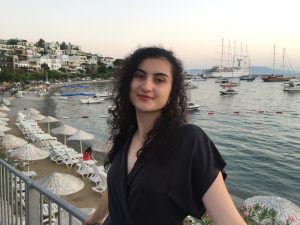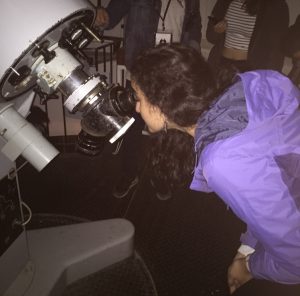We interviewed 3rd year MSci Physics student Bilgesu Aydın for our series! Bilgesu was President of the Imperial College Physics Society during the academic year 2020-21. She was the youngest president ever and the first woman to hold the title (as far as anyone in the Department today knows).
How did you come to study Physics?

I come from a fairly academic family, both my parents are academics and I spent most of my summers as a child around the university, among PhD vivas, chilling around with books. Academia was something in my life from a very young age. When I was younger I was definitely very interested in science – I used to read a lot of popular science books and magazines. I then had a period where I had changing phases of interests – these ranged from various forms of art and design to law and economics. It really wasn’t until my last two years of school that I decided for sure that I wanted to study physics and an internship I did at an observatory over the summer helped me make this decision. The pleasure I got from being able to answer questions about everything around me made want to learn as much physics as I can.
What are your interests within Physics?

Currently I’m still at a point where I’m discovering new interests in Physics. This summer I’m doing a UROP in Astrophysics, which is giving me a lot of insight into working in a research group in general, but also what I’m working on is quite closely related to cosmology which I find very interesting. My previous internship was more on the observational side of things and this is what happens after or as you wait for observation – building simulations, models, comparing that to data, working with and analysing data which I’m learning a lot about. A lot of fields within physics sound really interesting to me, it’s good to be surrounded by so many opportunities.
What were your reasons for running for President of the Physics Society? How was the experience?
One of the things that really stood out to me when I first got to Imperial and in Physics in particular, were events like Research Frontiers or Lunchtime Lectures. Obviously an undergraduate degree is pretty specific in what you need to cover in the first three years and it doesn’t change that much from one university to another, but what really stood out to me when I first got here were all these talks and lectures, I came to university and I very much wanted to learn more physics, learn more about the research, explore the different fields within physics so it was great to have that.

I was thinking I want to be part of this, I want to create opportunities for students to know more about other aspects of Physics. We have amazing talks from amazing people in the Department but also kind of extensions of Physics in relation to other things.
One of the talks I was the most excited about this year was a talk we had with the ethics advisor of the French Space Agency, on the ethics of space exploration (recording available). We also had one from an artist who works at Imperial – her work is based on the overlap between physics and art. I was super passionate about going beyond “textbook physics” or research symposium style talks. We have a fantastic undergraduate body, there’s almost a thousand of undergraduate students, hundreds of PhD students, we’re talking about one of the world’s biggest physics centres. The fact that the student body has diverse interests is great.
I think the one that was most well attended was the one with Derek Muller from Veritasium. That came up from the idea of, what does learning physics in the 21st century look like? There’s people on YouTube producing very creative and forward-thinking Physics content. Sometimes you go on YouTube and there’s a video that explains a concept better than your lecturer. So clearly this is a very important medium in the future of science communication. We hosted interesting and thought-provoking online talks with accomplished external speakers. Being a little more adventurous can be daunting but often yields great growth and improvement.
